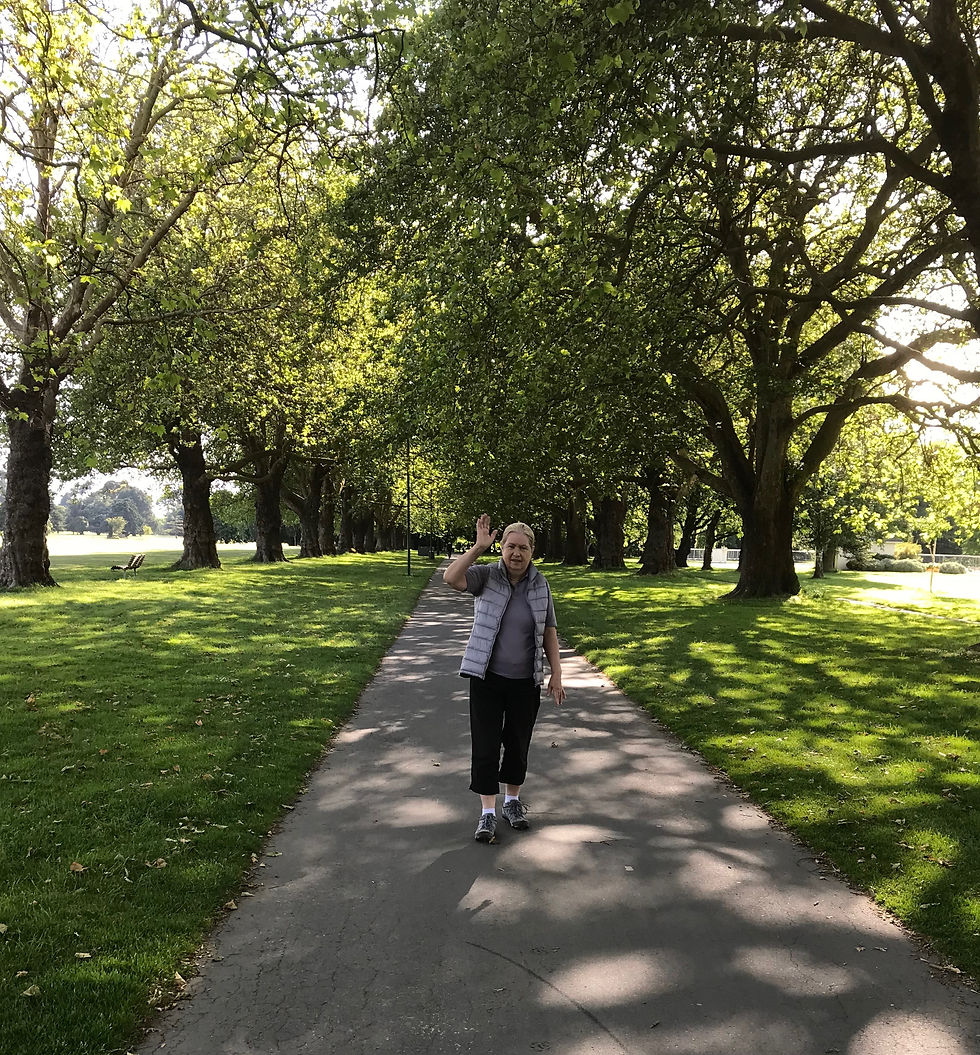4 Natural Remedies for Brain Fog
- Jean Jordan

- Jun 26, 2025
- 13 min read
Brain fog or a foggy brain can be really scary. Unfortunately the more stressed we are about our brain fog, as a consequence of worrying, the brain fog experienced can worsen.
To stop this spiral, you need to find ways for your brain to effectively ‘come together’. I use the term brain integration, a natural remedy. Brain neurons form connections in the brain, that enable us to think clearly, concentrate, remember easily and focus.
Causes of Brain Fog or Mental Fog
Brain fog can be the result of:-
o Side effects of medication
o Perimenopause and menopause
o Long Covid
o Chronic Fatigue Syndrome/ME
o Mental health issues, including anxiety
o Chronic health conditions, including chronic pain
How to Rewire Your Brain - Clear Brain Fog
In this blog I hope to give you reassuring information together with at home options that can be useful. These four natural remedies below are introduced and I expand on each one.
1. Contralateral movements, such as walking.
2. Brain gut connection – yes, nerve cells in your digestive system.
3. Information about B vitamins.
4. The free health product - water and hydration.
Practical ideas to improve memory, focus and concentration.
When was the last time you set off to the next room, only to arrive and wonder what you had come to collect or use.
This is not unusual or unique, it can happen to any of us and often is just a measure of how focussed we are at any given time. And hearing from my clients it certainly is not age related, people in their twenties and thirties can complain of brain fog if their brain is not living up to their expectations.
Read on to find out more about brain fog and what you can do to help
Why do I have brain fog?
What is brain fog?
Aah! I seriously have brain fog and what can I do about it?
From my Brain Fog Workshops that I ran in Christchurch, New Zealand, I have found an increase in the concerns around brain fog since Covid. Brain fog can be one of the side-effects of having Covid. This experience of Brain Fog can last for a long time, although how effectively it can be separated from the challenges arising from our stress levels is hard to measure?
Brain fog, a tick box symptom on my client intake form
Brain fog has been a tick box symptom on my client intake form for nearly twenty years. It has been regularly ticked, probably due to the fact I work with chronic pain and anxiety, both of which can create a large impact on your life that can trigger the ‘fight or flight’ response.
I have also been using bilateral stimulation movements, treatments and exercises as an Educational KInesiologist that result in improved brain clarity.
Fight or Flight Can Cause Tunnel Vision

When in 'fight or flight' mode your brain is hard-wired to focus only on the threat in front of you, effectively producing 'tunnel vision'. Not remembering what was on the forgotten shopping list, whether you replied to that urgent email, or even remembered the time of that important business meeting.
Your brain is in survival mode!
After over two years of this topsy-turvy world it’s not surprising that there is a rise in the number of my clients ticking that ‘Brain Fog’ box.
Although as a Naturopath we have been using the words brain fog for decades, it is now accepted and many of you will be discussing brain fog with your doctor, although it is generally not recognised as a medical diagnosis. Therefore no pill to 'fix' brain fog.
What are some of the symptoms of Brain Fog?
According to the Scottish National Health Service some of the symptoms may be
Ø Poor concentration
Ø Feeling confused
Ø Thinking more slowly than usual
Ø Forgetfulness
Ø Lost words (this one is my own special favourite)
Ø Mental fatigue
They also say, the above can also be brought on by stress and lack of sleep, that again I would agree to have experienced but as I’ll explain later doesn’t mean your brain has experienced any damage.
What helps brain fog?
Now I mentioned ‘natural remedies’, but in fact one cause of your brain fog may be related to medications your are taking, or have taken for some time before the side effects listed above may have developed.
Eliminate any medical causes – such as medications or ongoing illness.
Before you continue reading and certainly before expending time on the natural remedies I advocate, ensure you have discussed your brain fog with your own GP, to eliminate the effect of medications, or polypharmacy (drug and drug) interactions from taking many different medicine, and ask for their guidance.
1.Natural Brain Fog Remedy - Walking
No groaning please, but the best way to wake up your brain is to move. It’s logical, as when we move our brain controls the parts of the body that moves.
The brain receives a message that we want to lift and bend our leg to climb the stairs that we are approaching, sending a message via your nervous system to all parts of your body to successfully and safely climb the stairs.
Contralateral or Bilateral Stimulation Movements of the Body
When we walk naturally swinging our arms and legs, it wakes both the left and right hemisphere and parts of our brain. Most of our movement and enervation is contralateral, as is much of our eyes and ears.
If you raise your right arm, it’s the left side of your brain organising the movement. If you move your left leg it’s the right side of your brain organising this movement. Therefore if you raise your right arm and left leg at the same time – wow, one switched on brain!
Research Proves Positive Effects of Walking
Research done by Oppezzo and Schwartz (2014) explored the mind body connection by investigating the changes in creative thinking when people walked as opposed pondering the same questions sitting down.
They found there was an average increase in creative output by 60%; ideas were generally more novel than those of the people sitting down. So, I should persevere with my standup desk and some walking on the spot, as I write this blog?
Therefore the contralateral action of walking has effectively caused some neuroplasticity changes or re-wiring in the brain. Improving brain connectivity.
Don't we all want that!

Walking is Good for our Brains.
Have you ever noticed after returning from a walk you have solved a problem or two, or you come home with a new idea, for a story, a new recipe or even recalled a previous pleasurable event or planned a trip? Not only can doing ‘in place contralateral marching, constantly making changes’ – this is IMPORTANT and must be done – the change is like a jolt to your brain.
Here's a demonstration - change often, boosts your brain
2.Natural Brain Fog Remedy - Brain Gut Connection
I want to point out to you the complexities of your brain. I'm sure most of you think of your brain being in your head and that it's composed of neurons those cells that transmit messages around your nervous system. But did you know that you have brain cells in your gut, yes your digestive tract?
To ensure a healthy brain we need a great digestive system.
The digestive system is how we get all our nutrition; therefore it’s obvious that how well our digestive system works influences our brain.
A healthy digestive system passes on the nutrients that our brain needs to function and to operate to it’s potential. One of which is memory and recall, accurate and fast processing when needed. Indigestion, constipation or other issues that I won't be going into today, are signs your digestive system is not working properly.
But it’s important you don't have any of these symptoms or take medications that have a negative impact on your digestive system. Remember, if your digestive system is not working properly it can affect your brain in the same way as many medications affect not only the digestive system but also again, our brains.
Migratory Motor Complex - Gut Clean Out
This is your bodies way of keeping your digestive tract effectively scrubbed clean and cleared out. It may also explain the recent changes or recommendations in how we eat or more importantly when we eat.
How naturopathy can provide solutions.
When I started to study and work as a naturopath I learned there were many things that naturopaths had been saying over the years that would help our health. For decades naturopathic medicine was saying "drink more water".
This is now very well accepted and something I will talk about later in this article. But what has also changed is the number of ways of eating, thousands online and millions of words of advice. Not surprising you’re confused.
Grazing – eating throughout the day no longer!
In the past some Naturopaths were advising people to graze; perhaps to have snacks or healthy foods with no more than a gap of say two hours. Or to have three meals, breakfast lunch and dinner with two snacks in between these meals. I think this idea was connected with helping to keep blood sugar levels even and perhaps to manage our hunger?
Fasting – overnight or for longer periods.
Lately you may have heard more about fasting. Much is written and YouTubed about overnight fasting that could be beneficial for your digestive system and overall health. Interesting, how ideas fluctuate and sometimes we're not too sure where this change comes from.
My own recommendations, as a naturopathic medicine practitioner, lie somewhere in between a total food fast and grazing. I grew up eating three meals a day, breakfast, lunch and dinner. Being English this was interspersed with cups of tea sometimes with a plain, morning tea biscuit.
Migratory Motor Complex – “housekeeper of the gut”

I've just recently been finding out more about a system that operates in your digestive tract called migratory motor complex or MMC. The best way to explain this process is imagining it’s time to spring clean your house.

Your house or garden shed is getting a bit cluttered, things need to be sorted out, filed away and basically, uncluttered so we can feel more relaxed and comfortable.
You started early in the morning maybe it’s that precious Saturday or Sunday for those of us that work during the week. But the phone keeps ringing, one of the children keeps coming in to disturb you, or the dog is looking for it’s favourite toy. Or worse somebody comes in and dumps something else in a space that you just cleaned out, rather frustrating!
The migratory motor complex is a system that spring-cleans your digestive tract. It needs a time when there is no food being processed by your digestive system. Like your ‘spring cleaning’ being interrupted, this cleaning up process will be stopped if you have something to eat. The MMC process won’t start up again until the food has moved through your digestive system.
The MMC usually begins 2 or 3 hours after a meal. It functions as a cleaning wave that pushes undigested matter, including bacteria from the small intestine to the colon. This occurs every 90-120 min only during fasting.
Once food enters the stomach MMC stops, and restarts only after another 2 or 3 hours.
MMC may be implicated in IBS – irritable bowel syndrome and SIBO – small intestine bacteria overgrowth. Certainly this way of eating is worth trying for a week or two then monitoring how you feel.
3.Natural Brain Fog Remedy - B Vitamins

Here are brief outlines of B Vitamins and their actions within the body. Before taking confimr with your pharmacist if they are suitable. For more information see references at the end of the article.
B1-Thiamine
Thiamine is important in the brain ATP energy production, via the conversion of carbohydrates necessary for nerve conduction and chemical synapses.
Thiamine provides maintenance of nerve membrane function, the synthesis of myelin and several types of neurotransmitters. Thiamine is involved in the biosynthesis of a number of cell constituents including the neurotransmitters acetylcholine, GABA and in the synthesis of precursors of DNA.
B2- Riboflavin
Riboflavin is involved in many different biological processes and is essential for maintaining good health. It is involved in ATP production; the body's production of energy.
Riboflavin has important antioxidant activity in itself but also as part of the enzyme glutathione reductase. It also activates vitamin B6 and folate.
An interesting aside that doesn't relate directly to this discussion on brain fog, is that vitamin B2 has been shown to be useful in migraine headaches.
B3 - Niacin
In the central nervous system, vitamin B3 has long been recognized as a key mediator of neuronal development and survival. Niacin has a neuroprotective role and its derivatives, especially its involvement in neurodegenerative diseases as well as other neuropathological conditions (ischemic and traumatic injuries, headache and psychiatric disorders). Niacin is important, particularly as nicotinamide, in growth and maintenance of the central nervous system (CNS).
B5 – Pantothenic acid.
Vitamin B5 is important for energy storage as well as energy release. It works alongside B1, B2 and B3 in this role. It is also involved in the synthesis of various amino acids, sterols (e.g. cholesterol) and vitamin D. It is necessary for the production of neurotransmitters acetylcholine and the formation of red cells.
Vitamin B5 plays an important role in adrenal function and with coenzyme A, is needed for proper adrenal cortex function and the synthesis of steroid hormones. Therefore you may see it marketed as part of a vitamin B complex supplement to support the body during times of "stress".
B6 – Pyridoxine
B6 is important in the synthesis of neurotransmitters like dopamine and serotonin and GABA, an inhibitory neurotransmitter. Pyridoxine strongly contributes to the proper functioning of the nervous system by facilitating neurotransmitter and myelin synthesis, and also controlling glutamate excitability and neuronal metabolism.
B6 is there however one of the vitamins that should not be taken in high dose long-term. This again illustrates that any supplementation you decide to take, needs to be discussed with your doctor or naturopath rather than self diagnosis purchased online without fully understanding suitable doses, present illnesses, medications and diet.
B9 – Folate
B9 or folic acid, as a coenzyme is an important part of many cellular functions, especially the growth and repair of nervous system tissue, smooth muscle, and red blood cells. In the light of folate’s fundamental role in DNA and RNA synthesis, deficiency of this nutrient will predictably impact most on those cells and tissues that have a high turnover, for example blood and cells in the gastrointestinal intestinal tract.
One important thing to note is antacids and protein pump inhibitors, often taken for indigestion, reduce folic acid absorption. Therefore you need to separate doses by 2 to 3 hours.
B12 – Cobalamin
Cobalamin plays an essential role as a coenzyme in many biochemical processes that maintain or restore the health of the nervous system. Thus, vitamin B12 is an especially important function in the DNA synthesis of myelin producing oligodendrocytes and the synthesis of myelin.
The myelin sheath surrounds the axons of many nerves and serves as an electrical insulation, thereby facilitating fast conduction velocity.
Final Thoughts on Vitamins for your Brain
Due to the enormous range and diversity in medications you need to be aware that certain types medication reduce the absorption or action of B vitamins. Always ask your doctor or pharmacist about interactions.
The above information shows the importance of your body having a good, ongoing supply of a range of B vitamins and the best way to ensure this is to have a balanced diet with a wide range of proteins; that’s fish, eggs, meat, eggs, diary, nuts, seeds and legumes, healthy oils for that fatty myelin sheath and as many different colours of fruit and vegetables that seasonal variations will allow.
A poor or limited intake of wholefoods cannot be replaced by taking vitamin pills.
This information on B vitamins is general information only to indicate their importance for healthy brain function. My main reference for the B vitamin information: Herbs & Natural Supplements by Lesley Braun and Marc Cohen.
4.Natural Brain Fog Remedy - Water & Hydration
This is going to be the easiest modification you can make to help your brain and relieve symptoms of brain fog.

You wouldn't run your car without oil, so we need to be hydrated to ensure the solvents, i.e. all of those things like digestive juices, cerebrospinal fluid that surrounds the brain and spinal-cord, tendons and muscles and even joints all need to be hydrated. Lubricated so they can all perform their respective functions that keep our body healthy, in homoeostasis and supporting us both mentally, physically and emotionally.
If the oil gets low the car still runs – it’s a machine – WE ARE NOT
If we are dehydrated it can effect brain changes, decreasing in size. Dehydration has been shown to be a reliable predictor of increasing frailty and deteriorating mental performance.
Hydration is more than thirst.
Historically the views of naturopathy have considered water to be an important part of health and wellness. From the 1800s the solariums advocated water therapy. Often dunking people in cold water or walking barefoot on dewey grass in the mountains.
I guess things have changed a little bit since then. But hydration and the function of water has always been a philosophy of naturopathic medicine.
Am I dehydrated?
Here's a test. The first time that you go to the toilet in the morning have a look at the colour of your urine. It should be pale yellow, think lemon juice. If it's a deep dark yellow perhaps you need to count the number of glasses of water you drank on the previous day? (If you take a lot of vitamin B2 and possibly some other medications or supplements it may affect the colour of your urine.)
Signs of dehydration - plus check medications?
Some of the early warning signs of dehydration may include
Feeling thirsty and lightheaded
Dry mouth
Tiredness
Having dark coloured, strong smelling urine
Passing urine, less often than usual
Dehydration is when your body loses more fluid than you take in. When you consider your daily intake of water one problem that is happening with some diets is much of the food that we eat is dry. Think of biscuits, think of bread and cakes that we often swill down with sweet or carbonated drinks. So you just need to check that your diet has some of that green stringy watery stuff and fruit that also contains a lot of water.
What happens when I drink more water?
In the first few days things can be inconvenient!
Perhaps you have to get up at night to go to the toilet. Think mind over matter give yourself a few days and all will return to normal.
I explained this to some of my clients who admit to drinking virtually no water at all, as if there been a drought, the earth is really dry, cracked and hard. Then after the first heavy rain, water just runs away rather than being soaked up by the dry land.
More trips to the toilet
Get more thirsty
Have more energy
Less fatigue
Brain works better
Time for a recap, take action to clear the Brain Fog!
These are my four natural remedies that could improve your symptoms of brain fog that you are experiencing. It is important that all symptoms are checked and discussed with your doctor to rule out any illnesses or possible indications of future health issues.
1. Walking, that contralateral movement.
2. Space between eating for MMC to work.
3. Vitamin B's - that great, varied and whole food diet.
4. Water to keep hydrated.
Take action today - Book appointment with Jean
More about neuroplasticity and neural networks
If you want to learn more about rewiring the brain and how neural networks impact out health and wellness. I have a page devoted to the brain
Enjoy!
Chrsitchurch Naturopathy Clinic - Special Interest in Chronic Anxiety and Chronic Pain
The information in this article is general in nature and in no way diagnoses any illness.
Jean Jordan is a naturopath, kinesiologist who has been practising in both Perth, Western Australia and Christchurch, New Zealand.
She also has an online chronic pain clinic Natural Pain Solutions, with a natural treatment philosophy and offers an individual treatment programme Pain-Less Journey.
References:
Herbs & Natural Supplements – An evidence-based guide by Lesley Braun & Marc Cohen. Elsevier Mosby, Australia.
Calderón‐Ospina, C. A. & Nava‐Mesa, M. O. (2020). B Vitamins in the nervous system. CNS Neuroscience & Therapeutics, 26 (1), 5-13. doi: 10.1111/cns.13207.
Oppezzo M, Schwartz DL. Give your ideas some legs: the positive effect of walking on creative thinking. J Exp Psychol Learn Mem Cogn. 2014 Jul;40(4):1142-52.
Brain Gym 101 – Balance for Daily Life by Paul & Gail Dennison, Edu-Kinesthetics, Inc.




Comments